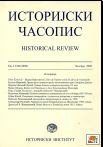Кривично дело паљевине у законодавству цара Стефана Душана према рукописима старије редакције
Arson in the Legislation of Tsar Stephan Dushan according to the Manuscripts of More Ancient Redaction
Author(s): Biljana MarkovićSubject(s): History
Published by: Istorijski institut, Beograd
Keywords: The Syntagm of Matiya Vlastar; Tsar Dushan’s Code; arson; village; town; manuscripts of the more ancient redaction; regulation; accident; suspect; punishment
Summary/Abstract: Arson is a crime if committed intentionally or maliciously and was often followed by cruel punishments (jure talionis) according to older law sources. In the legislation of Tsar Dushan, arson can be found in several articles in the Abridged Syntagm of Matiya Vlastar and in Tsar Dushan’s Code in manuscripts of the more ancient redaction and also in Iustinian’s Law and in Tsar Dushan’s Code in manuscripts of the more recent redaction. This crime is contained in a variety of Byzantine legal sources the most important of them being: Ekloga, Agricultural legal Code, Prochiron, Epanagoga and later the Syntagm of Matiya Vlastar and The Six Books of Constantine Armenopulos. In the Abridged Syntagm the regulations contain descriptions of different forms of arson in villages and towns, in both rural and urban life conditions. A judicial inquiry was regulated in order to determine all the circumstances of the accident, when significant destruction of property had occurred. Arson is prosecuted with attention to the degree of severity and sometimes was followed by death sentence by decapitation or burning to death. Tsar Dushan’s Code deals with arson in articles 99 and 100 (according to the generally accepted numeration of Stojan Novakovic). Collective responsibility of the village (articles 99) for the damage and destruction of property if the village does not hand over the suspect to the authorities is regulated in all manuscripts of the more ancient redaction. If the village would hand over the suspect, he would be investigated. If he would be found guilty, he would be punished with death sentence. In case the arson was committed outside the village (article 100) collective responsibility was regulated for the territory of the surrounding villages if the suspect had not been handed over to the authorities as in the previous article.
Journal: Историјски часопис
- Issue Year: 2011
- Issue No: 60
- Page Range: 139-151
- Page Count: 13
- Language: Serbian

